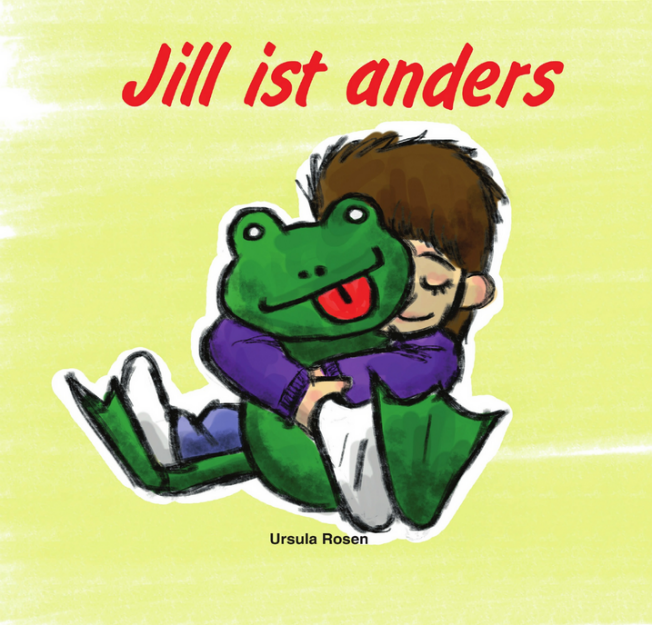EECERA Conference 2025 – Guest Blog # 39: Jill Is Different
Posted 24th August 2025
One of a series of short blog posts by presenters who will be sharing their work at the upcoming annual conference in Bratislava, Slovakia. Any views expressed in this post are those of the author(s) and do not necessarily reflect the official stance of their affiliated institution or EECERA.
Jill Is Different: How a children’s book sparked a cross-cultural research journey
By Dr. Halah Elkarif, Faculty of postgraduate Studies for Education, Cairo University, Egypt

Once upon a time, there was a German children’s book called Jill Is Different, about an intersex child joining a kindergarten class. The other children try to figure out whether Jill is a boy or a girl – an impossible classification. Told entirely from the children’s perspectives, the book was both innovative and potentially controversial.
One day, the book came into the hands of Professor Tim Rohrmann at HAWK University in Germany. Fascinated, he contacted the author and discovered the story existed in several other languages – but only in informal translations, without professional publication or accompanying research. Already deeply engaged in issues of gender and early childhood education, Professor Rohrmann was less curious about adult debates and more interested in children’s perspectives. How would children perceive Jill? If the book was read to them, would they engage with the story, question it, or treat it like any other picture book? Little was known about how children respond to stories addressing sensitive topics such as intersexuality.
With this curiosity, he began a small research project in Germany, reading the book aloud and observing children’s responses. At the time, I was his PhD student and joined the project by translating the book into my mother tongue, Arabic. Soon, other students and co-researchers translated it into Turkish, Russian, and additional languages. With these translations, a new idea emerged: why not explore children’s responses across different cultural and social contexts, using an interactive read-aloud method?
Together, Professor Rohrmann and I reached out to colleagues abroad, inviting them to conduct similar sessions in their countries. Step by step, a small project grew into an international collaboration – driven by curiosity, commitment, and passion, without external funding.
What began as a simple project – one book, one objective, multiple languages – evolved into a multilayered, cross-cultural research journey full of surprises, challenges, and fascinating findings. Some co-researchers even took on the task of translating the book themselves into their local languages, which was far from easy. Others faced unexpected ethical and legal considerations unique to their country, particularly when researching intersexuality in early childhood contexts. Children’s reactions also varied widely: a page that was highly engaging in one country could leave children indifferent in another. Even Jill’s name was interpreted differently – sometimes as a boy, sometimes as a girl, and sometimes simply as a “foreign” character – depending on the social and cultural context.
Yet across all contexts, one feature remained constant: a reflective, non-comparative approach among researchers. This was never about ranking or comparing countries. Instead, it was a child-centered exploration of how diverse social and cultural environments shape children’s engagement with the same story, using the same method.
The project, which started in Germany, has since expanded to five countries and continues to grow. Each new context has offered fresh insights – on how children interpret Jill’s story, how educators choose to guide (or sometimes avoid) discussions on gender, and how cultural norms shape understanding and dialogue.
If you would like to follow the next chapter of this journey, we warmly invite you to our self-organized symposium at the EECERA Conference: Exploring Intersexuality: A Child-Centered Approach. Three presentations will shed light on different facets of our research:
• Linguistic and ethical challenges in researching intersex children across five countries
• Children’s responses to the book in Germany, Japan, and South Africa
• Early childhood educators’ perspectives from the Czech Republic, Greece, and Japan
Our research is ongoing, but one clear message has already emerged: we are all different – not just Jill. Differences surface in cultural contexts, research perspectives, and methodological approaches. Yet through attentive, reflective observation, we can better understand and support children’s experiences while embracing diversity in both research and practice.
We invite you to join us at Symposium Set B16 | Tuesday, 26 August 2025 | 15:40–17:00 | Room G244, Faculty of Arts. (Schedule liable to change; please refer to final programme for details).
Come and witness our research journey – and perhaps continue the next chapter with us in your own country.
